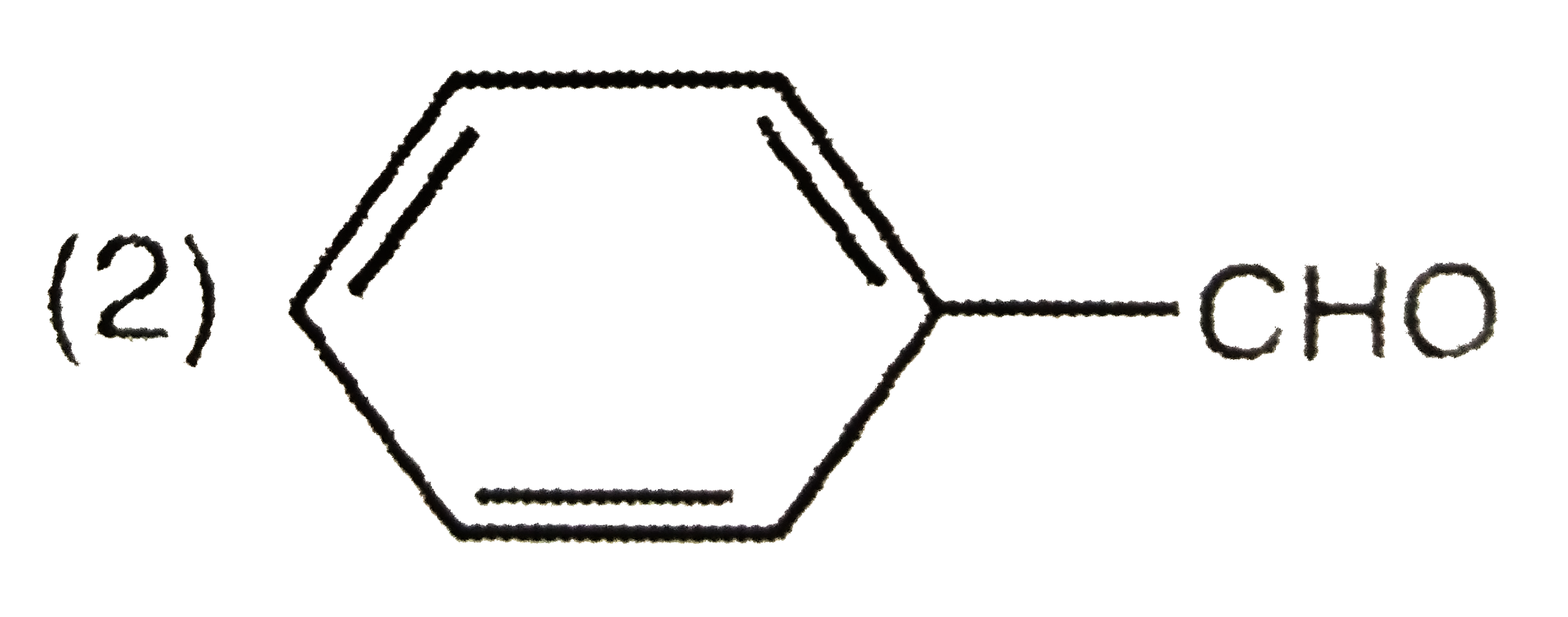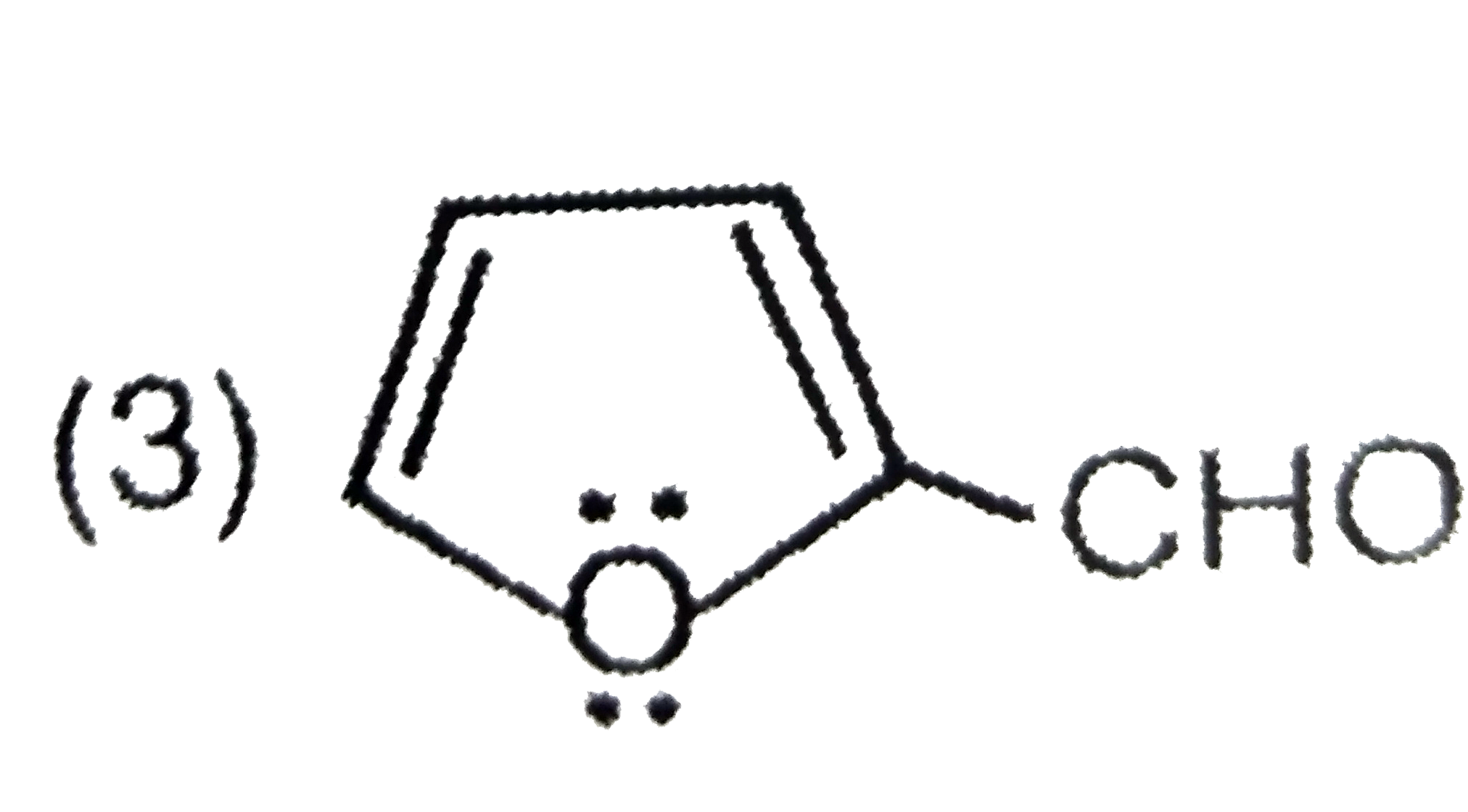Cannizzaro reaction does not take place with
(CH3)3CCHO


CH3CHO
The correct Answer is:A
To determine which compound does not undergo the Cannizzaro reaction, we first need to understand the conditions under which this reaction occurs.
1. Understanding the Cannizzaro Reaction:
- The Cannizzaro reaction is a redox reaction that occurs in aldehydes that lack alpha hydrogen atoms. In this reaction, one molecule of aldehyde is oxidized to a carboxylic acid, while another molecule is reduced to an alcohol.
2. Identifying Aldehydes:
- Aldehydes are compounds with the functional group -CHO. The general structure can be represented as RCHO, where R is a hydrocarbon group.
3. Alpha Hydrogen Concept:
- Alpha hydrogens are the hydrogen atoms attached to the carbon adjacent to the carbonyl carbon (C=O). For the Cannizzaro reaction to occur, the aldehyde must not have any alpha hydrogens.
4. Examples of Aldehydes:
- Formaldehyde (HCHO) and benzaldehyde (C6H5CHO) are examples of aldehydes that do not have alpha hydrogens and can undergo the Cannizzaro reaction.
- On the other hand, acetaldehyde (CH3CHO) has alpha hydrogens (the three hydrogens on the methyl group) and therefore does not undergo the Cannizzaro reaction.
5. Conclusion:
- The compound that does not undergo the Cannizzaro reaction is acetaldehyde (CH3CHO) due to the presence of alpha hydrogens.
Final Answer:
Acetaldehyde (CH3CHO) does not undergo the Cannizzaro reaction.
- The Cannizzaro reaction is a redox reaction that occurs in aldehydes that lack alpha hydrogen atoms. In this reaction, one molecule of aldehyde is oxidized to a carboxylic acid, while another molecule is reduced to an alcohol.
- Aldehydes are compounds with the functional group -CHO. The general structure can be represented as RCHO, where R is a hydrocarbon group.
- Alpha hydrogens are the hydrogen atoms attached to the carbon adjacent to the carbonyl carbon (C=O). For the Cannizzaro reaction to occur, the aldehyde must not have any alpha hydrogens.
- Formaldehyde (HCHO) and benzaldehyde (C6H5CHO) are examples of aldehydes that do not have alpha hydrogens and can undergo the Cannizzaro reaction.
- On the other hand, acetaldehyde (CH3CHO) has alpha hydrogens (the three hydrogens on the methyl group) and therefore does not undergo the Cannizzaro reaction.
- The compound that does not undergo the Cannizzaro reaction is acetaldehyde (CH3CHO) due to the presence of alpha hydrogens.
Acetaldehyde (CH3CHO) does not undergo the Cannizzaro reaction.
Topper's Solved these Questions
- CARBONYL COMPOUNDS (ALDEHYDES & KETONES ) & CARBOXYLIC ACID BOOK - RESONANCE ENGLISHCHAPTER - CARBONYL COMPOUNDS (ALDEHYDES & KETONES ) & CARBOXYLIC ACID EXERCISE - PART- IV
13 Videos
- CARBONYL COMPOUNDS (ALDEHYDES & KETONES ) & CARBOXYLIC ACID BOOK - RESONANCE ENGLISHCHAPTER - CARBONYL COMPOUNDS (ALDEHYDES & KETONES ) & CARBOXYLIC ACID EXERCISE - Exercise-3
1 Videos
- CARBONYL COMPOUNDS (ALDEHYDES & KETONES ) & CARBOXYLIC ACID BOOK - RESONANCE ENGLISHCHAPTER - CARBONYL COMPOUNDS (ALDEHYDES & KETONES ) & CARBOXYLIC ACID EXERCISE - Exercise-2 Part-I
1 Videos
- BIOMOLECULES & POLYMERBOOK - RESONANCE ENGLISHCHAPTER - BIOMOLECULES & POLYMEREXERCISE - ORGANIC CHEMISTRY(Biomolecules & Polymer)
34 Videos
- CHEMICAL KINETICSBOOK - RESONANCE ENGLISHCHAPTER - CHEMICAL KINETICSEXERCISE - PHYSICAL CHEMITRY (CHEMICAL KNIETICS & RADIOACTIVITY)
49 Videos
Similar Questions
Knowledge Check
Cannizzaro reaction is not given by
AtrimethylacetaldehydeBacetaldehydeCbenzaldehydeDformaldehyde.Cannizzaro reaction is not given by
AtrimethylacetaldehydeBacetaldehydeCbenzaldehydeDformaldehyde.Cannizzaro reaction is not given by
AtrimethylacetaldehydeBacetaldehydeCbenzaldehydeDformaldehyde.
Cannizzaro's reaction
View SolutionCannizzaro's reaction is not given by
View SolutionThe light reaction does not take place in
View SolutionWhich of the following reaction does not take place at cathode ?
View SolutionIf hydrogen and oxygen are mixed and kept in the same vessel at room temperature, the reaction does not take place to form water because
View Solution
